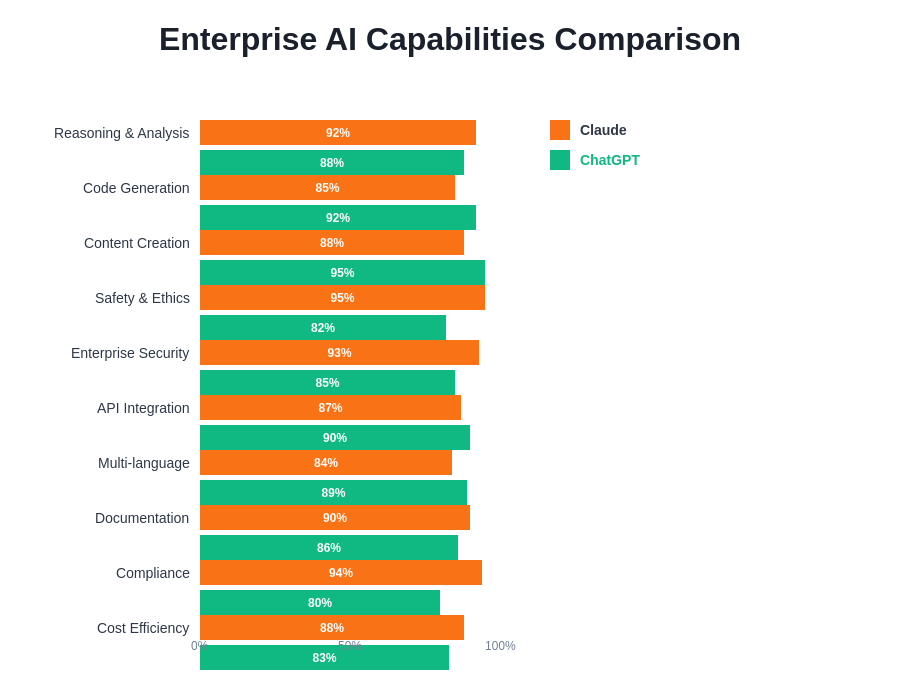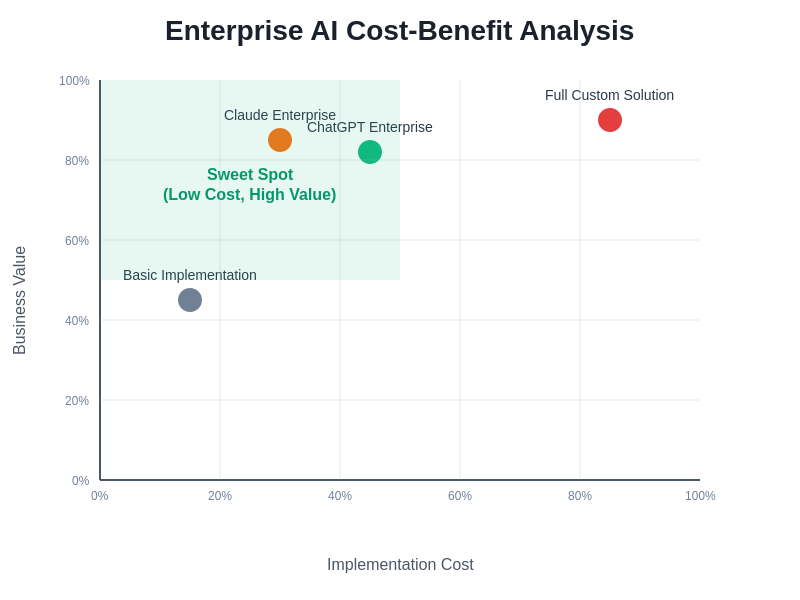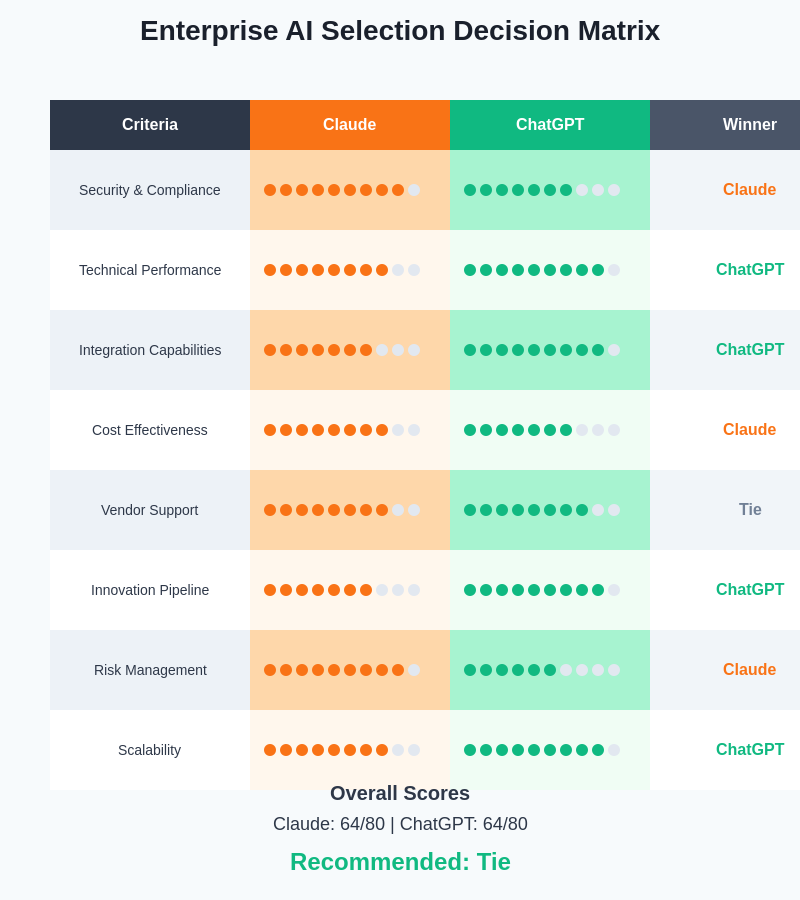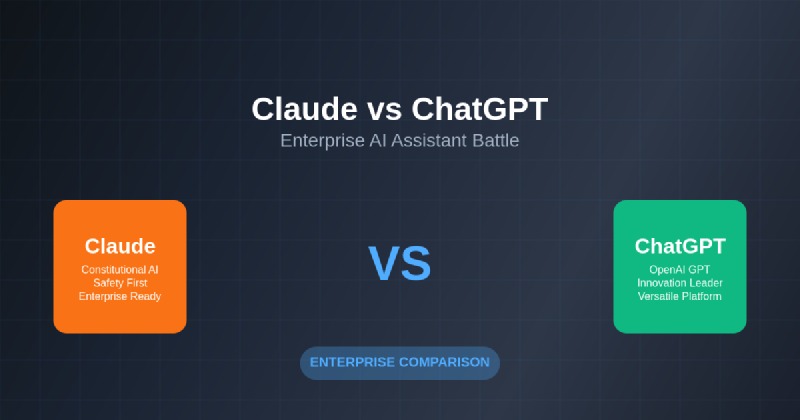The enterprise artificial intelligence landscape has been fundamentally transformed by the emergence of sophisticated AI assistants, with Anthropic’s Claude and OpenAI’s ChatGPT leading the charge in revolutionizing how businesses approach knowledge work, decision-making, and operational efficiency. As organizations increasingly recognize the strategic importance of AI integration, the choice between these two powerful platforms has become a critical decision that can significantly impact productivity, security, compliance, and long-term competitive advantage in an increasingly digital business environment.
Stay updated with the latest AI developments as enterprise AI adoption accelerates across industries worldwide. The selection of the right AI assistant for enterprise deployment requires careful consideration of multiple factors including technical capabilities, security frameworks, compliance requirements, integration possibilities, and total cost of ownership considerations that extend far beyond simple feature comparisons.
Understanding Enterprise AI Requirements
Enterprise AI deployment demands a fundamentally different approach compared to consumer applications, with organizations requiring solutions that can seamlessly integrate into existing workflows while maintaining the highest standards of data security, regulatory compliance, and operational reliability. The complexity of modern business environments necessitates AI assistants capable of handling sensitive information, supporting multiple stakeholders with varying expertise levels, and delivering consistent performance across diverse use cases ranging from strategic planning to routine operational tasks.
The evaluation of enterprise AI solutions must encompass technical performance metrics, security architectures, compliance certifications, scalability considerations, and long-term vendor relationships that ensure sustainable value delivery. Organizations must also consider the broader ecosystem implications of their AI choices, including integration capabilities with existing enterprise software, data governance frameworks, and the potential for future expansion as AI capabilities continue to evolve rapidly.
Anthropic Claude: The Constitutional AI Approach
Anthropic’s Claude represents a distinctive approach to enterprise AI through its foundation in Constitutional AI principles, which prioritize safety, transparency, and ethical behavior as core design elements rather than secondary considerations. This philosophy has resulted in an AI assistant that demonstrates remarkable consistency in maintaining appropriate boundaries while delivering sophisticated analytical capabilities that align with corporate governance requirements and risk management protocols.
Claude’s architecture emphasizes interpretability and predictable behavior patterns that enable enterprise users to develop confidence in its recommendations and outputs. The system’s training methodology incorporates extensive safety measures and alignment techniques that reduce the likelihood of generating inappropriate, biased, or potentially harmful content, making it particularly attractive for organizations operating in regulated industries or handling sensitive stakeholder communications.
Experience Claude’s enterprise capabilities to understand how Constitutional AI principles translate into practical business value through enhanced reliability and trustworthiness. The platform’s emphasis on helpful, harmless, and honest interactions creates a foundation for sustainable enterprise adoption that minimizes reputational risks while maximizing operational benefits.
OpenAI ChatGPT: The Scale and Innovation Leader
OpenAI’s ChatGPT has established itself as the pioneering force in conversational AI, leveraging massive scale training data and continuous innovation cycles to deliver cutting-edge capabilities that often set industry benchmarks for performance and versatility. The platform’s extensive ecosystem includes multiple model variants, API integrations, and enterprise-specific offerings that provide organizations with flexible deployment options tailored to diverse business requirements and technical environments.
ChatGPT’s rapid development pace and extensive community support have created a rich ecosystem of third-party integrations, custom applications, and specialized tools that enhance its enterprise utility across various industries and use cases. The platform’s ability to handle complex reasoning tasks, generate high-quality content across multiple domains, and adapt to specialized business contexts has made it a preferred choice for organizations seeking to implement AI-driven innovation initiatives rapidly.
The enterprise version of ChatGPT includes enhanced security features, administrative controls, and compliance certifications that address many of the concerns associated with deploying AI systems in corporate environments. These improvements, combined with OpenAI’s commitment to continuous capability enhancement, position ChatGPT as a compelling option for organizations prioritizing cutting-edge performance and extensive customization possibilities.
Technical Capabilities and Performance Analysis
The technical performance comparison between Claude and ChatGPT reveals distinct strengths that align with different enterprise priorities and use cases. Claude demonstrates exceptional performance in tasks requiring careful reasoning, ethical consideration, and nuanced analysis of complex business scenarios, particularly excelling in areas such as strategic planning, risk assessment, and stakeholder communication where precision and appropriateness are paramount considerations.
ChatGPT showcases superior performance in creative tasks, rapid content generation, and handling diverse query types with impressive versatility and speed. The platform’s extensive training data and sophisticated architecture enable it to tackle complex technical problems, generate detailed documentation, and provide comprehensive analysis across a broader range of specialized domains compared to many competitors in the enterprise AI space.

Performance benchmarking across various enterprise scenarios reveals that both platforms demonstrate exceptional capabilities in their respective areas of strength, with Claude consistently delivering more conservative, well-reasoned outputs while ChatGPT provides more creative and diverse response patterns that can stimulate innovative thinking and comprehensive problem exploration.
Security and Compliance Frameworks
Enterprise AI deployment requires robust security architectures that protect sensitive business information while enabling productive use of AI capabilities across organizational functions. Claude’s security framework emphasizes data privacy, access controls, and audit trails that align with enterprise governance requirements, providing organizations with confidence that their proprietary information remains protected throughout AI interactions and processing workflows.
The platform’s approach to data handling includes strict privacy protections, limited data retention policies, and transparent information governance practices that support compliance with regulations such as GDPR, CCPA, and industry-specific requirements that govern data protection in sectors like healthcare, finance, and legal services. These features make Claude particularly attractive for organizations operating in highly regulated environments where compliance violations can result in significant financial and reputational consequences.
ChatGPT’s enterprise security features include advanced encryption, enterprise-grade access controls, and comprehensive administrative dashboards that enable IT teams to monitor usage patterns, enforce governance policies, and maintain security standards across large organizational deployments. The platform’s security certifications and compliance documentation provide organizations with the assurance needed to integrate AI capabilities into mission-critical business processes while maintaining regulatory compliance requirements.
Explore comprehensive AI research capabilities with Perplexity to supplement your enterprise AI strategy with advanced information gathering and analysis tools that enhance decision-making processes. The integration of multiple AI platforms can create synergistic effects that amplify the value delivered to enterprise users while maintaining appropriate security boundaries.
Integration and Deployment Considerations
The practical implementation of enterprise AI solutions requires careful consideration of integration capabilities, deployment architectures, and ongoing maintenance requirements that extend far beyond initial platform selection decisions. Claude’s API design emphasizes simplicity and reliability, making it relatively straightforward to integrate into existing enterprise applications while maintaining consistent performance characteristics that support predictable business operations.
The platform’s documentation and developer resources provide comprehensive guidance for enterprise implementation scenarios, including best practices for data handling, error management, and performance optimization that help organizations achieve successful deployments with minimal technical complications. Claude’s integration approach prioritizes stability and predictability, characteristics that align well with enterprise requirements for reliable, consistent system behavior across diverse operational contexts.
ChatGPT offers extensive integration possibilities through its comprehensive API ecosystem, plugin architecture, and third-party connector availability that enable sophisticated custom implementations tailored to specific business requirements. The platform’s flexibility in handling various input formats, supporting multiple programming languages, and accommodating diverse deployment architectures makes it suitable for complex enterprise environments with existing technology investments and specialized integration requirements.
Cost Structure and Business Value Analysis
The economic evaluation of enterprise AI solutions must encompass both direct costs and broader business value considerations that include productivity improvements, operational efficiency gains, and strategic competitive advantages that can be difficult to quantify but represent significant value creation opportunities for forward-thinking organizations.
Claude’s pricing structure typically emphasizes predictable costs and transparent usage metrics that enable organizations to budget effectively for AI integration while avoiding unexpected cost escalations that can complicate enterprise technology planning processes. The platform’s efficient processing capabilities often translate into favorable cost-per-interaction ratios that make it economically attractive for high-volume enterprise applications where cost control is a critical consideration.

ChatGPT’s pricing model offers various tiers and customization options that can accommodate diverse enterprise budgets and usage patterns, from small-scale pilot implementations to large-scale organizational deployments that serve thousands of users across multiple business functions. The platform’s extensive feature set and customization capabilities can justify higher costs through enhanced functionality and broader applicability across various enterprise use cases.
Use Case Specialization and Industry Applications
Different enterprise scenarios favor different AI approaches, with Claude demonstrating particular strength in applications requiring careful reasoning, ethical considerations, and conservative decision-making that aligns with risk management protocols and corporate governance requirements. Industries such as healthcare, legal services, and financial services often find Claude’s cautious, well-reasoned approach more suitable for their operational requirements and regulatory environments.
The platform excels in applications such as contract analysis, regulatory compliance assessment, strategic planning support, and stakeholder communication where accuracy, appropriateness, and risk minimization are primary concerns. Claude’s ability to maintain consistent performance while avoiding potentially problematic outputs makes it particularly valuable for organizations operating in sensitive or highly regulated business environments.
ChatGPT’s versatility and creative capabilities make it exceptionally well-suited for applications requiring innovation, content generation, and complex problem-solving across diverse domains. Industries such as marketing, technology, research and development, and creative services often benefit from ChatGPT’s ability to generate diverse perspectives, explore unconventional solutions, and adapt rapidly to changing requirements and emerging challenges.
Performance Scalability and Enterprise Readiness
Enterprise AI deployments must demonstrate consistent performance characteristics across varying load conditions, user populations, and operational scenarios that reflect the complex, dynamic nature of modern business environments. Claude’s architecture emphasizes stability and consistent response times that support reliable enterprise operations, with performance characteristics that remain predictable even under high-demand conditions that can challenge less robust AI systems.
The platform’s enterprise readiness is demonstrated through its consistent behavior patterns, predictable resource utilization, and reliable uptime metrics that enable organizations to integrate AI capabilities into mission-critical business processes with confidence. Claude’s approach to scalability prioritizes maintaining quality and consistency rather than simply maximizing throughput, a philosophy that aligns well with enterprise requirements for reliable, professional-grade service delivery.
ChatGPT’s scalability architecture leverages OpenAI’s extensive infrastructure investments and continuous optimization efforts to deliver high-performance AI capabilities at enterprise scale. The platform’s ability to handle diverse query types, support multiple concurrent users, and maintain responsive performance across various application scenarios makes it suitable for large-scale enterprise deployments with demanding performance requirements.
Data Governance and Privacy Management
Enterprise AI implementations must address complex data governance requirements that encompass privacy protection, data lifecycle management, audit trail maintenance, and compliance reporting capabilities that support organizational accountability and regulatory compliance obligations. Claude’s data governance framework emphasizes privacy-by-design principles that minimize data exposure risks while enabling productive AI utilization across various business functions.
The platform’s approach to data handling includes configurable retention policies, comprehensive audit logging, and transparent data processing practices that enable organizations to maintain control over their information assets while benefiting from AI capabilities. These features are particularly important for organizations handling personal data, proprietary information, or confidential business intelligence that requires careful protection throughout the AI interaction process.
ChatGPT’s enterprise data governance capabilities include advanced administrative controls, comprehensive usage monitoring, and flexible data handling policies that can be customized to meet specific organizational requirements and regulatory obligations. The platform’s data governance tools enable IT teams to implement appropriate controls while maintaining user productivity and system functionality across diverse enterprise use cases.
Support Infrastructure and Vendor Relationships
The long-term success of enterprise AI deployments depends significantly on the quality of vendor support, documentation resources, training programs, and ongoing relationship management that extends beyond initial platform implementation. Anthropic’s approach to enterprise support emphasizes personalized service, comprehensive documentation, and collaborative relationship development that helps organizations maximize the value derived from their AI investments.
Claude’s support infrastructure includes dedicated account management, technical consultation services, and comprehensive training resources that help enterprise users develop proficiency with AI capabilities while avoiding common implementation pitfalls. The company’s commitment to transparency and ethical AI development creates a foundation for trust-based vendor relationships that support long-term strategic partnerships rather than simple transactional interactions.
OpenAI’s support ecosystem leverages its extensive community resources, comprehensive documentation, and established partner network to provide enterprise customers with multiple avenues for assistance, training, and capability development. The platform’s mature support infrastructure reflects its market leadership position and extensive experience with enterprise deployments across various industries and use cases.
Future Development Trajectories and Strategic Considerations
The rapidly evolving nature of AI technology requires enterprise buyers to consider not only current capabilities but also the likely trajectory of future development, investment priorities, and strategic direction that will influence long-term value creation and competitive positioning. Anthropic’s research focus on Constitutional AI and safety-first development suggests continued emphasis on reliability, interpretability, and ethical behavior that aligns with conservative enterprise requirements and risk management priorities.
The company’s commitment to advancing AI safety research while delivering practical business value positions Claude as a potentially attractive long-term partner for organizations prioritizing stability, predictability, and responsible AI implementation over cutting-edge performance characteristics that may introduce additional complexity or risk factors into enterprise operations.
OpenAI’s aggressive innovation timeline and substantial research investments suggest continued leadership in AI capability advancement, with regular introduction of new features, enhanced performance characteristics, and expanded functionality that can provide early adopter advantages to enterprise customers. The company’s ecosystem approach and extensive partnership network create multiple pathways for capability enhancement and customization that can support diverse enterprise requirements and strategic objectives.
Strategic Decision Framework for Enterprise AI Selection
The choice between Claude and ChatGPT for enterprise implementation should be guided by a comprehensive evaluation framework that considers organizational priorities, risk tolerance, technical requirements, and strategic objectives that extend beyond simple feature comparisons. Organizations prioritizing safety, compliance, and conservative decision-making may find Claude’s Constitutional AI approach more aligned with their operational requirements and corporate governance frameworks.
Companies seeking cutting-edge capabilities, extensive customization options, and rapid innovation adoption may be better served by ChatGPT’s versatile platform and extensive ecosystem support. The decision should also consider integration requirements, existing technology investments, internal AI expertise, and long-term strategic vision for AI utilization across various business functions and operational contexts.

The optimal choice often depends on specific use cases, organizational culture, risk management requirements, and strategic priorities that vary significantly across different enterprises and industries. Some organizations may benefit from implementing both platforms for different use cases, leveraging each system’s strengths while minimizing exposure to their respective limitations through thoughtful application design and deployment strategies.
Implementation Best Practices and Success Factors
Successful enterprise AI implementation requires careful planning, comprehensive change management, and ongoing optimization efforts that extend far beyond initial platform deployment. Organizations should develop clear governance frameworks, establish performance metrics, and create feedback mechanisms that enable continuous improvement and value maximization throughout the AI adoption lifecycle.
The implementation process should include comprehensive user training, clear usage guidelines, and appropriate support structures that help employees leverage AI capabilities effectively while maintaining compliance with organizational policies and regulatory requirements. Success factors include executive sponsorship, cross-functional collaboration, and commitment to iterative improvement based on user feedback and performance data analysis.
Enterprise AI success also depends on developing appropriate integration architectures, maintaining data quality standards, and establishing monitoring systems that enable proactive identification and resolution of performance issues or compliance concerns before they impact business operations or create organizational risks.
The future of enterprise AI lies in the thoughtful integration of powerful AI capabilities with human expertise, organizational knowledge, and strategic vision to create sustainable competitive advantages while maintaining the highest standards of ethical behavior, regulatory compliance, and operational excellence. The choice between Claude and ChatGPT represents just the beginning of a transformative journey that will reshape how businesses approach knowledge work, decision-making, and value creation in an increasingly AI-augmented world.
Disclaimer
This article is for informational purposes only and does not constitute professional advice regarding enterprise technology decisions. The comparison presented reflects publicly available information and general industry analysis rather than specific vendor endorsements or recommendations. Organizations should conduct thorough evaluations based on their specific requirements, consult with qualified technology advisors, and consider multiple factors including security, compliance, integration, and long-term strategic objectives when making enterprise AI platform decisions. The AI landscape continues to evolve rapidly, and capabilities, features, and competitive positioning may change significantly over time.
